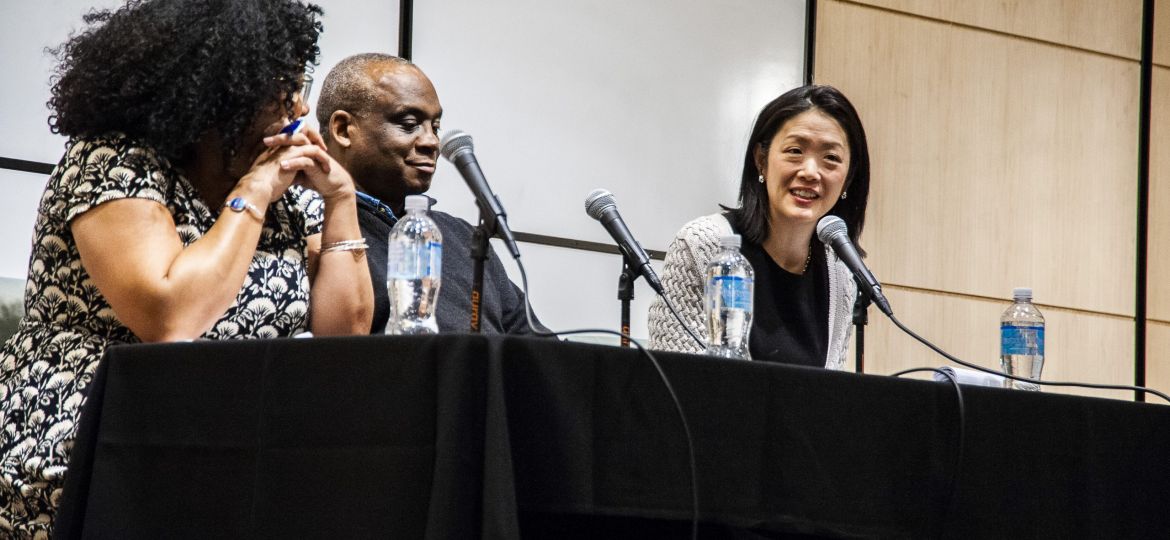
The St. Olaf Department of Social Work and Family Studies hosted a panel on Thursday, March 7 that highlighted the nuances of adoption that are often skipped over in mainstream conversation and education.
Lisa Moore, assistant professor of social work and family studies, said some students have a hard time identifying with the way adoption is presented in St. Olaf classes. Moore explained that she wants to expand this narrative.
This event was one step towards considering “how we can have a more inclusive body of content regarding the family experience,” Moore said.
Moore also emphasized that Minnesota is one of the top states for transracial adoption, so the complexities of adoption should be important parts of conversations both on campus and across the state.
The event featured panelists Elizabeth Raleigh, a sociology professor at Carleton College who has conducted research on the market of adoption, Lucius Luther, the first single black male parent to adopt in Minnesota and Lisa Marie Rollins, a writer, performer and educator whose work often addresses adoption. She is also the founder of Adopted and Foster Adults of the African Diaspora (AFAAD).
Raleigh began with her personal experience as an adult Korean adoptee, and then moved to discuss the market of adoption.
“Why do white parents adopt across race?” Raleigh said. From observing public adoption information sessions, she has found the process of adoption to be like a market selling a commodity. That commodity is children, and though many people recoil from the association between children and the market, Raleigh argues that private adoption is extremely wrapped up in money.
Transracial adoption is popular in part because the children are more available, she said, and because the adoptions are closed. That being said, adoption is currently declining, making the demand for babies that much more competitive.
“Adoption agencies in this time of retraction have really stepped up their consumer language,” Raleigh said. Agencies emphasize “the idea of the adoptive parents being a consumer.” Often in this market, the role of race is left to the side as parents attempt to acknowledge the culture of their child without truly acknowledging the “role of race in America,” Raleigh said.
Luther began by explaining that he was not eligible for a child in the kind of private market Raleigh had been talking about because he did not have the money, and because he was a single male. He also explained that public child welfare does not provide the healthy white babies that so many adoptive parents are looking for, so in this less desirable market he was able to receive his daughter.
He spoke of both the love and the difficulty that came from raising his daughter.
“Even the best adoptive families are still born out of disruption and loss and stress” Luther said.
Often, adoptive parents do not have realistic expectations, and Luther acknowledged that raising his own biological child could have been equally challenging. He did explain the difficulties of navigating the adoption system as an African-American single parent. Many of the workers “didn’t really have an understanding of what it meant to be an African-American parent or a parent of a minority child in a culture and in a society and in a child welfare system that has very little respect for what the economic, financial and social challenges are for those people,” Luther said.
Rollins responded to both of these speakers by stating that she tells her personal story so that others can empathize.
“I bleed all over the table so that potential adoptive parents or social workers or anyone considering transracial adoption will listen,” Rollins said.
Rollins addressed the importance of the body in adoption, that the body of an adoptee is moved around for consumption and the pleasure of others, a subject she writes about in her new book. She explained that with all this movement and separation from origins, it is difficult for adoptees to find solid ground.
“I want to talk about what could possibly come after all of this anger and trauma and things that we are asked to share as adoptees so that we can be sold and saved,” Rollins said, “I want to know what happens after.”
She spoke then about creating spaces that are real, supporting women to keep their children and ultimately helping adoptees reassemble themselves.
The panelists then answered questions, both personal and about the larger system of adoption, hoping to address the overlooked aspects of adoptee experiences and acknowledge the flaws in this system.

